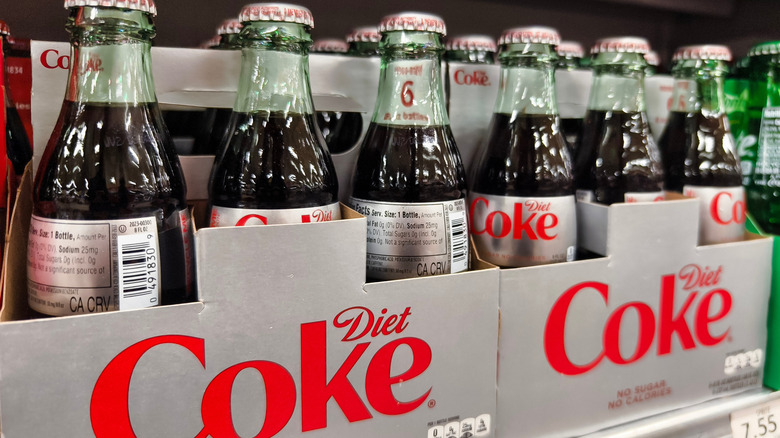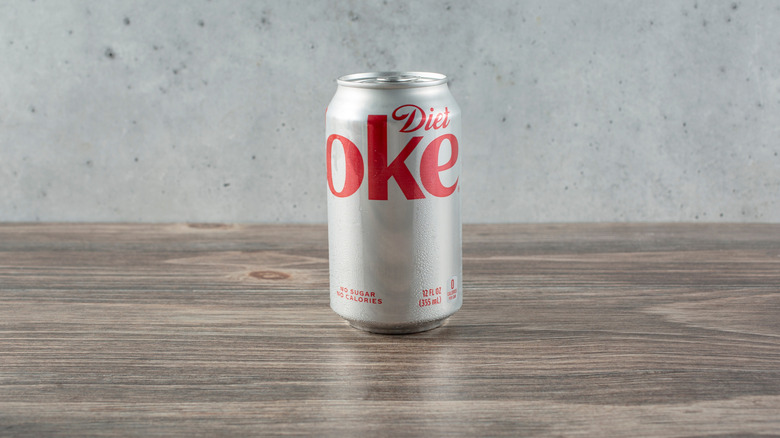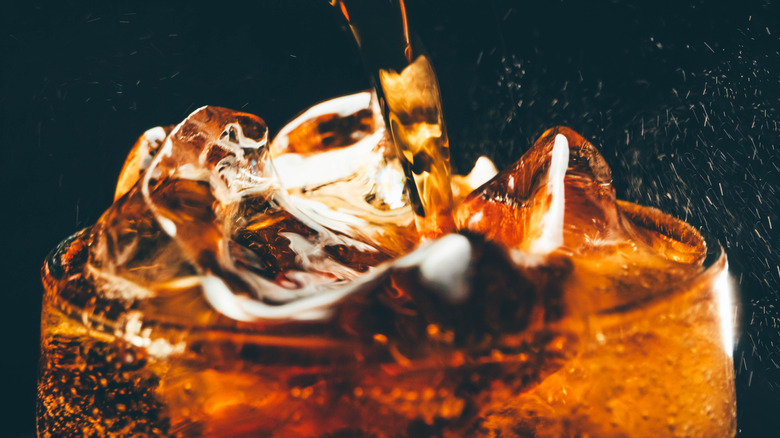Does Drinking Diet Coke Really Increase Your Cancer Risk?
Many people tend to put a decent amount of faith that whatever is sold to us on store shelves or at restaurants is safe to consume. Ongoing research, however, can put the safety of some foods or ingredients into question, with even grocery store staples like red meat being linked to cancer. Another such item is the fizzy drinks that we love to consume, with a particular focus on Diet Coke.
There are two ingredients in Diet Coke that bring into question how healthy it is (or isn't). Those are the artificial sweetener aspartame and the caramel coloring, the latter of which gives the soda its brown appearance. Both of these ingredients have been labeled as possibly carcinogenic. Of course, that does not automatically mean that they cause cancer. While some research does not directly support that drinking Diet Coke can increase your cancer risk (as reported on Healthline), what makes it confusing is that experts in the field are yet to completely agree.
The issue with caramel coloring is that some versions of it are made with a chemical called 4-methylimidazole, also known as 4-Mel. Dr. Urvashi Rangan, a toxicologist and executive director of Consumer Reports' Food Safety and Sustainability Center, stated, "There's no reason why consumers should be exposed to an avoidable and unnecessary risk that can stem from coloring food brown. Manufacturers have lower 4-MeI alternatives available to them. Ideally there would be no 4-MeI in food."
The health risks of drinking Diet Coke
Both aspartame and the 4-Mel in caramel coloring are classified as possibly carcinogenic, which means they carry some potential risk. Another significant health worry is that sweeteners like aspartame can contribute to obesity. This is either directly through its nutritional profile or indirectly by contributing to excessive consumption of unhealthy foods and drinks.
Obesity has been linked to cancer due to the increase in fat cells, which in turn can increase growth hormones, telling your body to divide cells more often. It also causes cells to cluster in high-fat areas, leading to inflammation and increased rates of cell division. Without wanting to simplify the subject too much, when your body divides cells more often, it puts you at a higher risk for cancer. Obesity has a link to many types of cancer, including myeloma, meningioma, pancreatic cancer, kidney cancer, and breast cancer. Science is constantly discovering new ways of fighting cancer (such as AI helping to identify breast cancer), but the challenge remains.
Another reason why the link between Diet Coke and cancer cannot be universally ruled out is the limits of the research done. The World Health Organization's (WHO) Head of the Standards and Scientific Advice on Food and Nutrition Unit, Dr. Moez Sanaa, stated, "We need better studies with longer follow-up and repeated dietary questionnaires in existing cohorts. We need randomized controlled trials, including studies of mechanistic pathways relevant to insulin regulation, metabolic syndrome and diabetes, particularly as related to carcinogenicity."
The arguments in favor of Diet Coke
Both the WHO and the International Agency for Research on Cancer (IARC) have agreed that there is only limited evidence linking aspartame to cancer. Therefore, it isn't completely considered a risk. For anyone to state that there is a clear and direct link between Diet Coke and cancer would be factually wrong, at least according to the latest science.
The Food and Drug Administration (FDA) also affirms that aspartame, when used as directed in limited quantities, is completely safe based on all the information available. As one would expect, the FDA takes its regulation seriously, issuing prompt food and drink warnings, such as the recall of a baby formula product because it was released without prior notification to the FDA, thereby attempting to avoid FDA-required inspections.
Caramel coloring is also not always manufactured with 4-Mel, and some laws have been implemented to properly warn consumers about the associated risk. This includes California's Proposition 65, which requires food labels to have a health warning if they have an excessive amount of 4-Mel. Altogether, many organizations and agencies take food and drink safety seriously and are working diligently to ensure items like Diet Coke are safe for the average consumer.


